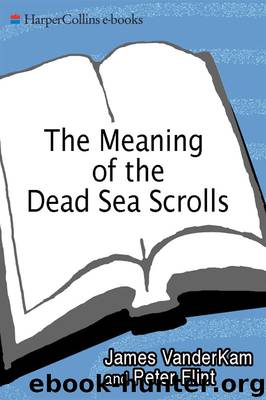The Meaning of the Dead Sea Scrolls by James VanderKam

Author:James VanderKam
Language: eng
Format: epub, mobi
Publisher: HarperCollins
Published: 2013-06-16T16:00:00+00:00
AGREEMENTS BETWEEN THE SECTARIAN SCROLLS AND ANCIENT DESCRIPTIONS OF THE ESSENES
The second line of argument in support of the Essene identification is that the traits of the group as they emerge from the sectarian scrolls and the ones found in ancient accounts of the Essenes agree and that this is the case for no other group. There is a long list of parallels between these sources and a shorter one of discrepancies. The major classical descriptions of the Essenes are found in two writings of the Jewish historian Josephus (ca. 37–100 CE): the Jewish War (esp. 2. 119–61) and the Jewish Antiquities (esp. 13. 171–73; 18.18–22); and in two treatises by Philo of Alexandria (ca. 20 BCE-50 CE): Every Good Man Is Free (75–91) and Hypothetica: Apology for the Jews. There is no evidence that either of these authors was aware of the settlement on the shore of the Dead Sea; rather, they wrote about Essenes who were more a part of Jewish society. It is possible that their descriptions of the Essenes derive from a common source; if so, that source would have been written no later than the early part of the first century CE. Some important parallels are summarized below.
Same Theology
The sectarian texts from Qumran and the ancient descriptions of the Essenes attribute the same theology to the group. The early sources do not focus on this aspect of the Essenes; they devote more space to their practices. But what they do say about them agrees with what we find in the scrolls. Josephus, in a well-known statement, contrasts the views of the Jewish groups regarding what he calls fate:
Now at this time [Josephus is writing about the rule of Jonathan, 152–142 BCE] there were three schools of thought among the Jews, which held different opinions concerning human affairs; the first being that of the Pharisees, the second that of the Sadducees, and the third that of the Essenes. As for the Pharisees, they say that certain events are the work of Fate, but not all; as to other events, it depends upon ourselves whether they shall take place or not. The sect of Essenes, however, declares that Fate is mistress of all things, and that nothing befalls men unless it be in accordance with her decree. But the Sadducees do away with Fate, holding that there is no such thing and that human actions are not achieved in accordance with her decree, but that all things lie within our power, so that we ourselves are responsible for our well-being, while we suffer misfortune through our own thoughtlessness. (Antiquities 13.171–73)6
Download
The Meaning of the Dead Sea Scrolls by James VanderKam.mobi
This site does not store any files on its server. We only index and link to content provided by other sites. Please contact the content providers to delete copyright contents if any and email us, we'll remove relevant links or contents immediately.
The Five People You Meet in Heaven by Mitch Albom(3554)
The Secret Power of Speaking God's Word by Joyce Meyer(3175)
Real Sex by Lauren F. Winner(3014)
Name Book, The: Over 10,000 Names--Their Meanings, Origins, and Spiritual Significance by Astoria Dorothy(2978)
The Holy Spirit by Billy Graham(2944)
0041152001443424520 .pdf by Unknown(2843)
How The Mind Works by Steven Pinker(2813)
ESV Study Bible by Crossway(2773)
Ancient Worlds by Michael Scott(2682)
Churchill by Paul Johnson(2578)
The Meaning of the Library by unknow(2564)
The ESV Study Bible by Crossway Bibles(2550)
The Gnostic Gospels by Pagels Elaine(2527)
MOSES THE EGYPTIAN by Jan Assmann(2411)
Jesus by Paul Johnson(2352)
City of Stairs by Robert Jackson Bennett(2347)
The Complete Dead Sea Scrolls in English (7th Edition) (Penguin Classics) by Geza Vermes(2272)
The Nativity by Geza Vermes(2226)
Ancient Near Eastern Thought and the Old Testament by John H. Walton(2223)
